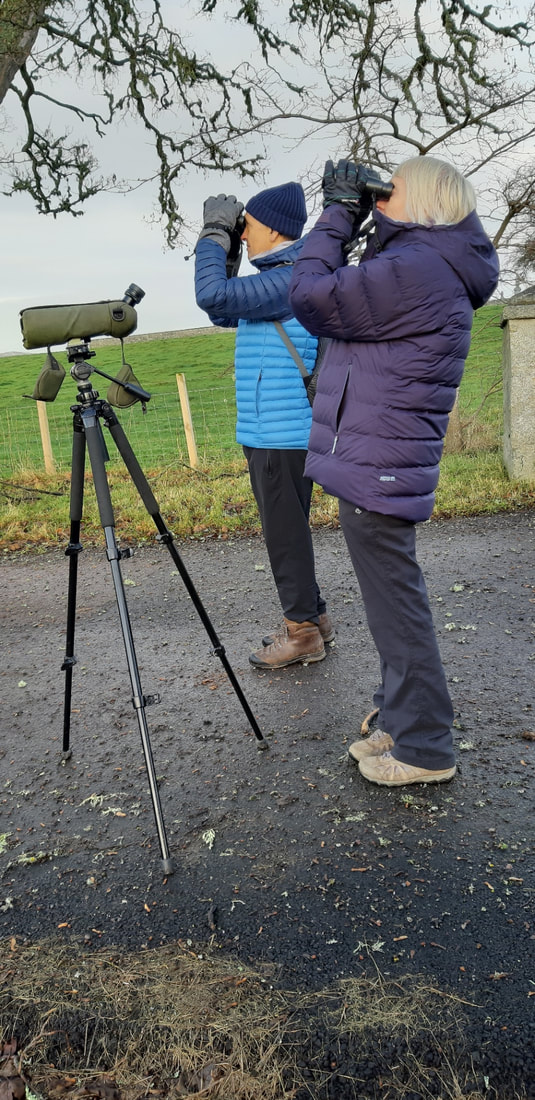
Not exactly a Beginners’ Walk – more a walk for those who wanted to learn more about the calls, the jizz of commoner birds and glean some tips to make them easier to recognise as they fly off into the distance.
The walk began with excellent close views of five roe deer grazing near Broomhill Station and very quickly we were picking up our first birds – several greenfinches, then a family of house sparrows, a reed bunting and a distant yellow hammer. On a bit and there was a splendid male yellowhammer in full view with a female nearby for useful comparison. A common buzzard was overhead and we picked out some distant greylag geese as well as a pheasant or three, then, whizz, a small male sparrowhawk low down over our path.
There were coal tits a plenty in the pines but no goldcrests today, so on to the end of the first stretch of the Speyside Way. We walked up past the farm where, sure enough and right on cue was a flock of some 200 finches nearly all of which were brambling – a first for one of us and we did get some really good views. By now we were very cold indeed but had to stay put as another, very mobile, flock came into view swirling around over the field and into the trees – the linnets. Our patience was rewarded when they swirled again and came down in the seed heads and, yes, there were a few twites with them.
Café and hot soup next – very welcome as we thawed out before going on into Dell Woods where blue, great and coal tits were helpfully feeding together giving us a chance to look at the size differential. The female woodpecker obligingly came down to look at us but it seemed that we weren’t to get lucky with a crested tit – another lifer for one of us. However, again, patience is the name of the game and, before dusk fell, there he was in all his subtle crested glory, busy with the peanuts before going to roost for the night.
Because there were only the three of us we had some interesting conversation too, ranging from reintroductions and rewilding - to species of snakes and fungi – to the iniquities of some drivers and so-called wild campers! Only 27 species but a thoroughly good day! Why don't you join us and improve your birding skills in friendly company?
Sue Sykes
The walk began with excellent close views of five roe deer grazing near Broomhill Station and very quickly we were picking up our first birds – several greenfinches, then a family of house sparrows, a reed bunting and a distant yellow hammer. On a bit and there was a splendid male yellowhammer in full view with a female nearby for useful comparison. A common buzzard was overhead and we picked out some distant greylag geese as well as a pheasant or three, then, whizz, a small male sparrowhawk low down over our path.
There were coal tits a plenty in the pines but no goldcrests today, so on to the end of the first stretch of the Speyside Way. We walked up past the farm where, sure enough and right on cue was a flock of some 200 finches nearly all of which were brambling – a first for one of us and we did get some really good views. By now we were very cold indeed but had to stay put as another, very mobile, flock came into view swirling around over the field and into the trees – the linnets. Our patience was rewarded when they swirled again and came down in the seed heads and, yes, there were a few twites with them.
Café and hot soup next – very welcome as we thawed out before going on into Dell Woods where blue, great and coal tits were helpfully feeding together giving us a chance to look at the size differential. The female woodpecker obligingly came down to look at us but it seemed that we weren’t to get lucky with a crested tit – another lifer for one of us. However, again, patience is the name of the game and, before dusk fell, there he was in all his subtle crested glory, busy with the peanuts before going to roost for the night.
Because there were only the three of us we had some interesting conversation too, ranging from reintroductions and rewilding - to species of snakes and fungi – to the iniquities of some drivers and so-called wild campers! Only 27 species but a thoroughly good day! Why don't you join us and improve your birding skills in friendly company?
Sue Sykes
 RSS Feed
RSS Feed
